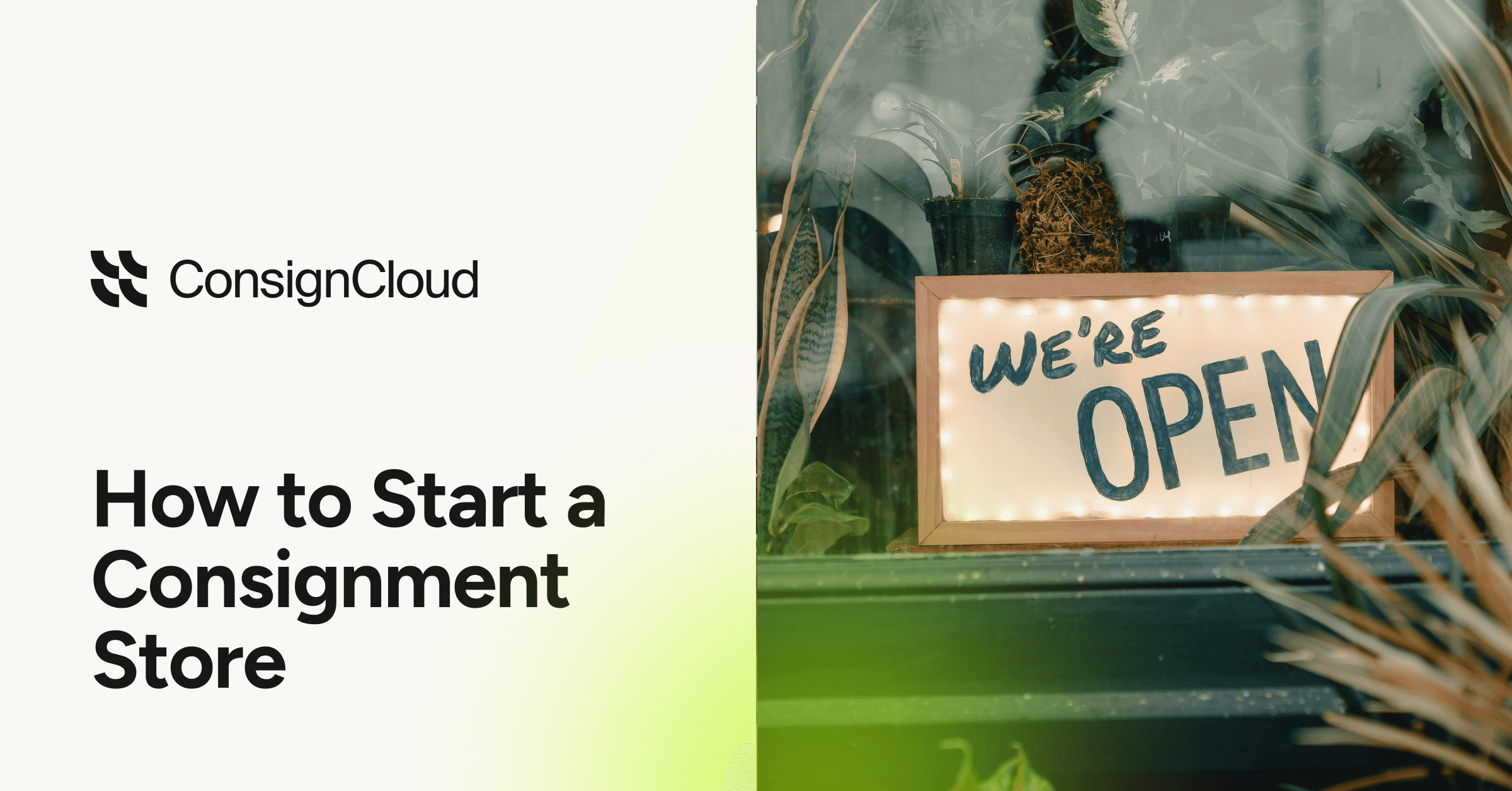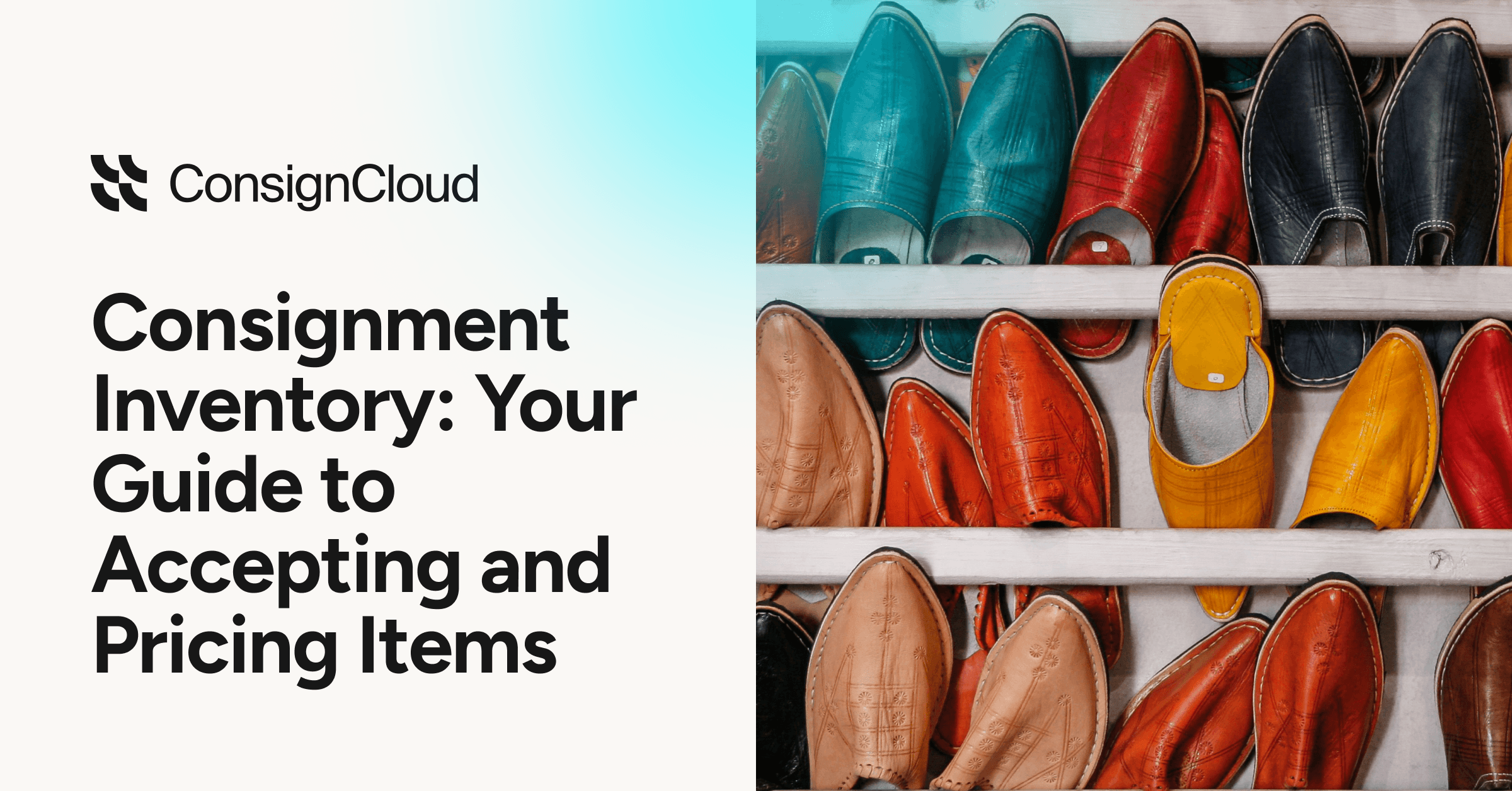Your Consignors and You

Jon Staab
Jul 20, 2021
Running a consignment shop is a lot like running any other business —
— marketing, bookkeeping, and hiring work the same regardless of how you procure your inventory. In most cases, if you're not sure about something, you can look up best practices with a single web search.
But there's one huge exception to this rule.
Most retailers have wholesalers they can turn to again and again to stock their shelves in bulk. But a resale supply chain is more like that of a high-end restaurant. Instead of purchasing massive quantities of ingredients from a single source, a good chef will cultivate individual relationships with local small farmers, cheesemakers, brewers, and bakers.
Likewise, any consignment shop worth its salt will have dozens, or even hundreds of consignors and vendors. The relationships you build with these people are the cornerstone of your business.
But when it comes to building and maintaining these relationships, there are no easy answers. It takes creativity and initiative to recruit new consignors, and fanatical devotion to keep them coming back.
That's why we put together this post — so you can learn how to find and keep quality consignors. Along the way we'll include links to other resources so that you can dig deeper into anything that piques your interest. Here's what we'll cover:
Why people choose consignment
Delighting your consignors
More than just a supply chain
When consignment goes bad
A vision for consignment
This post is pretty long, so it's ok to take it one section at a time. Otherwise, go brew yourself a hot drink, find a comfy chair, and let's dive in!
Why do people choose consignment?

Consignment is serious business, no less for your consignors and vendors than for you the shop owner. This means that the number one motivation for anyone getting into the resale hustle is to make money. In the same way that customers love a bargain, it's critical that your consignors feel like they're getting a good deal too.
The key to this, counterintuitively, is to learn how to say "No". Taking too much low-quality inventory hurts your business by forcing you to spend a lot of time and money on processing new items, moving things around and, eventually, returning things to your consignors. Saying "No" also demonstrates to your consignors that you have a high standard for what you receive into inventory. This can help them realize that having their piece accepted by your store is a privilege, not a right.
In addition, refusing low-quality consignments allows space for you to be generous with what you do accept. One great tool for balancing profit and payouts for these items is inventory mix. High-volume, cheaper items can be bought outright or consigned at a low split without making your consignors feel ripped off. Expensive items, however, like luxury handbags, jewelry, or furniture, might be harder for them to let go of at a steep discount.
Luckily, since margins are better on expensive inventory, you can afford to bump up the consignor's split by 10-20% to make them feel like they got out what they put in. Use this tactic well, and your consignors will bring more high-end goods in, moving your entire store upmarket!
There's plenty more to be said about how to help your consignors make lots of money while staying comfortably profitable yourself, but the point is that this is table stakes for running a profitable shop. If you're not paying out enough to your partners, no amount of shine or hype will save your store. Normally, average COGS should come in at a little over 40% (with some variation depending on your business model and what kind of inventory you sell). If you're way below that number, you may need to make some adjustments.
That said, there's a lot more to consignment success than just the financial side of things!
More than cold cash
Consignment isn't the only way for people to make a buck. Why is establishing a relationship with a local consignment store more appealing than, say, becoming a secret shopper, selling tchotchkes on eBay, or even doing consignment online?
To start with, let's state the obvious: it's fun to go places! If your store has lots of personality, is well decorated, and has a great selection of things for sale, people will enjoy being there. But there's more to making your shop attractive than just window dressing.
The key is to tell a story about your shop. Everyone wants to make a positive impact on the world, but it's impossible to do it alone. Your consignment business has the potential to be the place where good stuff happens. This is harder if you don't have a physical location, but not impossible — so if you're online-only, stay with me!
In many ways, the ability to tell a compelling story is unique to resale — where else do people get together with their friends to create a rare and special shopping experience? Your store has the potential to be about something other than making money. But it's also true that having a compelling vision can end up helping your bottom line.
Below are three kinds of stories that you can tell about your resale business that will make people excited to work with you instead of your competitor down the road.
Resale reduces waste
The first is also the most obvious — resale is as green as you can get. Just take a look at ThredUp's 2020 Resale Industry Report — it's full of great information on how resale is good for the environment. Here's an example:
If everyone wore a thrifted outfit to a wedding next year, it would save 1.6B lbs of CO2e. That's the equivalent of taking 56M cars off the road for a day.
Read the full report for many more interesting facts and figures!
But don't just stop at feeling good about your business model — you have an edge over exclusively online stores like ThredUp and Poshmark. As it turns out, shipping packages thousands of miles is bad for the environment! There are things you can do to mitigate the impact of your online store, but the fact is, receiving inventory and selling it in the same location is about as efficient as you can get.
Local business is worth it
Local businesses aren't just good for the environment — they're good for everyone! Here are some stunning stats that prove how great local business is:
Small businesses create more jobs than big businesses — in fact, small businesses have accounted for more than 65% of new jobs since the 1970s.
According to Local First, "when West Michigan consumers choose a locally owned business over a non-local alternative, $73 of every $100 spent stays in the community. By contrast, only $43 of every $100 spent at a non-locally owned business remains in the community."
More money spent on local businesses means more tax revenue for your jurisdiction — which means more investment in local roads, schools, parks, and more.
28 percent of shoppers buy local for better service and 19 percent to help local non-profits.
Your customers aren't the only people who care that you're a local business — your consignors want to sell local too! When they do, their split goes right back into their pocket, and the rest goes to you and your shop. Because your supply chain is local, an even higher percentage of your sales stays in the community, compared with other small businesses.
This has knock-on effects too; a thriving local economy encourages a healthy community by helping people meet their neighbors, get involved, and think more about how their own actions impact those around them.
Consigning for a cause
Mottos like "shop green" or "local first" are often enough to catch the eye of a potential customer and get them in the door. They're simple, to the point, and impossible to argue with. But for folks who are looking to invest more heavily in your shop by becoming a consignor — essentially a business partner — you need to prove that you're not just blowing smoke.
Charitable involvement is a hallmark of local business — non-profits often receive as much as 350% more money from local businesses than from non-locally owned businesses. You can prove that your interests are aligned with your shoppers and consignors by being more charitably engaged.
Getting started is a two-step process. First, find out what values you share with the people you hope to partner with. Then, put your money (and time) where your mouth is!
Do you want to raise support for young mothers? Help save an endangered species? Donate to a medical research project? Find something that you and your community can get behind, either with donations, volunteerism, or by simply raising awareness.
A great way to dip your toes into charitable giving is to simply donate 10 cents from every sale, or per item sold. If you let your consignors choose which charity to donate to, you can split the cost of the donation with them --- reducing the impact to your bottom line, while at the same time getting on the same page as your people.
Delighting your consignors

Let's stop beating around the bush though — it's great to run an ethical business, and it can even attract new partners. But as the novelty wears off, your consignors are going to start thinking less about how good your business is for the community, and more about the nuts and bolts of their consignment. Late payouts, lost items, and dead air can frustrate your consignors — even worse, if you're not careful your consignors may even forget you exist and silently drift away, taking their consignments with them.
It's often said that women think love is taking trouble for someone, while men think love is not causing trouble for them. But the truth is that love is doing both! The same applies to any business relationship — constant events and messages, frantic branding, and weekly sales can become obnoxious. Likewise, if dealing with your store is a headache, people will simply stop. Your job is to make your shop a delight to work with by removing obstacles and annoyances, as well as making every day a celebration.
Let the good times roll
First, let me give you some ideas for how you might gently remind your consignors to come back and shop or drop off new inventory. Remember, these techniques should be used sparingly — over-marketing your shop not only has diminishing returns, it can end up burning people out on your brand.
Create engaging content. Whether it's through blog posts, an email newsletter, or social media posts, content marketing is a sure-fire way to shape your brand, develop a rapport with your consignors and customers, and give readers and watchers something of value.
Implement a loyalty program, even if it's just a punch card system. You can do this with your consignors as well as your customers — for every 3 items sold, give them an extra $5 in credit! This will encourage your infrequent consignors to participate more often.
Give gifts to first timers. $10 in credit the first time they consign with you, or a small token of appreciation like a fancy candy or branded pen. Small things make a difference!
Make people excited to consign with you by entering them into a raffle for every item they sell.
Use your space to host events like wine tasting, dances, silent auctions, or children's events. Carve out a nook in the corner where people can sit and chat, or read a book.
Measure their impact. Generate reports to show consignors just how much money they've earned by selling with your store — and exactly how much they've supported the mission of your store.
Save them money. Give consignors a bonus if they spend earned credit instead of cashing out. Offer — and promote — a higher split for higher-volume consignors.
Mark time. Send small birthday gifts, commemorate the anniversary of their first consignment, or celebrate when they reach 10, 100, or 500 consignments.
As always, don't trust me to have all the good ideas — get creative!
Don't leave your shoelaces untied
There's no limit to the fun extras you can come up with to market your store, but be careful not to get tripped up by neglecting the less glitzy parts of running your shop. Below are some ways to reduce friction with your consignors, and make working with your store pleasant and hassle-free. I would be remiss if I didn't mention that we develop a software platform called ConsignCloud that is focused on solving a lot of these problems.
Get organized. Here are some things that consignors hate, in no particular order: lost items, emailing you and never receiving a reply, delayed payouts, not knowing whether something has been sold, selling items for less than they're worth, predatory consignor contracts. It's essential that you develop systems for intake, rotating stock, remitting or donating unsold items, paying out consignors, and communicating with customers, because otherwise things will fall through the cracks.
Be transparent. You consignors are putting themselves out there — don't leave them hanging. Frequent emails help keep your consignors up-to-date on items accepted, sold, expired, and ready for pickup. Some software platforms also provide a consignor portal where consignors can log in to get updates on their inventory. See a demo of ConsignCloud's portal here.
Go the extra mile. In any industry, good service is what separates the really successful businesses from the ones that fail to get traction. People who put on a phony "professionalism" to flatter their customers are missing the point — doing customer service means taking responsibility for making the relationship happen. If a consignor forgets to pick up their inventory, send a reminder and hang onto it. If they show up to collect their payout a few days after it has expired, pay it out anyway. Do more than feels comfortable, but within reason — there is a limit to how much you should accommodate a single consignor (more on that below).
Be flexible. Everyone has different styles of communication and levels of engagement — do your best to accommodate them, rather than forcing everyone into a rigid system. Do your consignors want to receive email notifications or call in to check on the status of their inventory? Do they prefer to be paid out via check, cash, or digitally? Would they rather consign their inventory to get the most out of it, or sell it directly to the store to earn less cash but get it faster?
Be open to negotiating with high-volume consignors, or on expensive or luxury items. Reward valuable consignors with a higher split on their items, depending on price point or loyalty. It may cost you some money in the short term, but high quality inventory can often compensate for lower margins by increasing sales volume.
My point here is that it's not necessarily what services you offer to your consignors, but how well they're executed. It's better to commit to less if it means you can actually pull off what you've promised — nothing undermines trust like broken promises. Stick to your commitments though, and you'll build up a stockpile of good will to draw from when you're ready to ask your consignors to return the favor.
More than a supply chain

As I've mentioned before, a resale or consignment shop is not just a business — it often has a culture of its own. Shared values, shared interests, and frequent interaction combine to create a whole that is more than the sum of its parts. Don't hesitate to use the strength of your community to compete. Once you've done the hard work of creating a brand that makes consignors feel like part-owners, it's time to take the next step and ask them to help grow the business. If they like what you've built, they'll be more than happy to return the favor!
Use that chatter
The number one way that your consignors can help you grow is through networking. It's pretty well known that there are only about six degrees of separation between you and anyone else on earth — especially Kevin Bacon. Say you have 100 consignors, and each of them tells ten friends to visit your store. Even if only 1% of those people actually engage with your business, you've still doubled your customer base!
Referral programs can take all kinds of shapes and sizes, from contact list scraping to referral bonuses. There's plenty of advice out there for putting together a generic referral program (see here for a basic strategy, and here for some more details). But let's think for a moment about how a referral program might work specifically in consignment.
Customers vs consignors
Normally referral programs are solely focused on getting new customers in the door — but that ignores the supply side of the equation, which is equally important for a consignment business. Luckily, many of the strategies you might use to find new customers apply to consignors as well, so broadening your referral program to both types of account is pretty easy.
The multiplier comes when you start viewing your customers as qualified consignor leads, and vice versa. If you can turn a customer into a consignor, or get a consignor to start shopping more regularly, she has essentially referred herself to your business. This is great for you, so don't neglect to treat that conversion like a real referral and give them the bonus they deserve!
Most referral programs include some kind of incentive for new customers as well as the people that referred them to you. In a consignment shop you can easily implement this by giving a boost to your contacts' store credit balance.
This can be preferable to offering a discount or handing out gift cards, since it gives you an opportunity to talk to your new customer about what store credit is, how it's spent, and how to earn more. Since they need an account with your store in order to spend their credit anyway, your consignment onboarding process is all but complete --- you've just gained a customer and a consignor!
Put them to work
One of the things that gets people into consignment is the desire to be entrepreneur-adjacent. While most consignors aren't interested in anything more than getting some cash back out of their old stuff, for others flipping used goods can balloon into a full-time job.
But there's a limit to how involved a consignor can get in a resale shop — who wants to turn their keys over to their customers? And nothing is worse than having your employees treat their job like a hobby. Instead, full-time consignors normally end up consigning at multiple different stores, or taking their consignments online.
But there is a business model that can include your restless consignors on a more day-to-day basis — they're often called cooperatives, collectives, or antique malls. The idea is that instead of selling consignors' inventory on their behalf, you manage a space where vendors come and sell their own inventory. The way this is normally monetized is through space rentals, or by charging a percentage of the profits.
This is a great way to divide up the work of running a shop — you can handle the logistics of incorporating, securing a lease, and putting together a point of sale, while your vendors procure inventory and take turns helping customers. Of course, this doesn't mean that you can't be a vendor in your own store too!
When consignment goes bad

So far we've focused on the upside — how to get consignors, keep them happy, and make the most of those relationships. But as any experienced business owner will tell you, things don't always go according to plan. It's important to think about how things might go off the rails, and to protect yourself and your shop when things get messy.
Protecting yourself
As in everything, an ounce of prevention is worth a pound of cure. If you find yourself in a confrontation with a consignor, you've already lost control of the situation. Instead of becoming an expert in conflict resolution, be sure to set clear expectations up front.
The most direct way to get off on the right foot with your consignors is to require everyone to sign a standard consignor contract before taking any consignments from them. A document like this lays out the ground rules for interacting with your store. This will not only protect you in the event of a lawsuit (may it never be!) but will also help your consignors take your business as seriously as you do.
Below are a few things you should consider when writing a consignment contract. Please note that this is not legal advice; please do consult a lawyer.
State the standard consignment split, including any variance by category, and additional fee structures. If you do negotiate on individual items, note that in the contract.
Include your standard consignment period, and what the procedure is for handling items that don't sell. In most cases you should give the consignor the option to pick up items when they expire, since they are still their property, but make sure to claim the right to donate or throw away items that aren't picked up after a certain period.
Be aware of laws regarding unclaimed property in your jurisdiction. These laws apply to intangible property, like unclaimed payouts, as well as tangible property, like abandoned consignment items. In the United States, unclaimed property must be turned over to the state after abandonment. If you intend to keep unclaimed consignments or store credit, be sure to make that explicit.
Reserve the right to refuse consignments, or to set different terms than are laid out in the contract on a case-by-case basis. Oftentimes consignors will want to have a say in how items are priced. Make sure to specify how that procedure works, as well as how items may be discounted.
Be sure to secure permission to use consigned items in promotional contexts, online as well as physical. If you take pictures or write descriptions of inventory, be sure to state that you own any related intellectual property.
It's great to have an ironclad defense, but keep in mind that enforcing a contract should be considered the "nuclear option". A contract is primarily a tool for setting expectations. It shouldn't need to be said, but never threaten your consignors with legal action!
Know thy consignors
While a contract can give you some peace of mind, don't get lulled into a false sense of security. Problems will still happen, but if you can stay on top of them you can keep them from getting out of control.
The best way to do this is to document everything. Signing a contract is a great first step, but everything downstream needs to be recorded as well — it's all well and good if you have a standard consignment period, but if you don't know the date that something was received, you don't know when you can donate it!
A software system that keeps a complete and durable record of inventory can bring you a long way to being able to prove to your consignors (and yourself!) that everything is as it ought to be. But not everything can be automated; keeping the pulse of your relationships with consignors is something that has to be personally tended to.
This can be quite challenging, particularly as you hire more employees to work in your store. An issue can easily slip through the cracks and escalate if you don't have a healthy culture of communication in your store.
Have a place where you can take notes about mistakes you've made, misunderstandings, and complaints. Whenever you prepare for an appointment with a consignor, glance through those notes to make sure there aren't any unresolved issues that need your attention. You can also proactively go through those notes and offer personal apologies or compensation to keep things running smoothly.
On the other hand, not everything is your fault. Whether through carelessness or belligerence, some people can be very difficult to deal with. Don't exhaust yourself fighting an uphill battle for someone who is constantly demanding concessions, re-negotiating commissions, or asking special favors.
When all else fails
If you can't come to an understanding with a difficult consignor, you may have to simply cut them loose and stop accepting new inventory. Be careful to do this as graciously as possible; your goal should be to conserve your energy for projects that benefit all your consignors, not to punish the troublesome partner. It's also not unheard-of for disgruntled consignors to leave a bad review for a shop when parting ways, so be sure to do everything you can to remain on amicable terms.
This is never a fun situation to be in. For the best chance at a good outcome, treat it like a breakup. Be firm and direct, and express sympathy and regret that the relationship didn't work out. Avoid blaming or shaming them, but do back up your actions with the necessary documentation. If you're dreading this conversation, bring someone along who can support you and keep things cool. If you're thinking of avoiding the conversation entirely, don't --- your responsibility as a store owner includes tying up loose ends. You can read more about how to break up a business relationship here.
This part of running a business is not fun, but it's worth it! At the end of the day, keeping short accounts with your business partners will allow you to focus on the parts of running your store that you enjoy.
A vision for consignment

Running a consignment store is not a get-rich-quick scheme, it's a lifestyle business. This does not mean that you have to work long hours, or always be available to fix every little emergency your shop might suffer in your absence. But it does mean that your heart should be in it. If you begin to coast, your shop will slowly die — not only will you hate your job, you won't be making any money from it.
So how do you maintain a vision for the future? Some resale businesses aim for growth, and may even manage to scale their operations up to a few locations. But for most boutique owners, the joy in the work is closely related to the smallness of the business. This means that success is qualitative, not quantitative. Don't aim at more, aim for better.
We've already looked at ideas for how you might "delight your consignors", but what makes you tick? Your happiness and productivity is the keystone of a successful resale shop. If you're not engaged, no one else will be! If you're too busy to be creative, too tired to be enthusiastic, or too stressed to negotiate with your consignors, no amount of grinding will make your shop the beehive of excitement and activity it should be.
So what part of your job do you hate the most? Take out a sheet of paper and write down every task that you perform to manage and run your business. Once you have that list, rank the tasks in order of enjoyment, and then figure out how to delegate your least favorites to free up your time for other things.
Next, look at the top of the list. Do you love coming up with new and creative window displays? Offering goods that your patrons can't find anywhere else? Networking with your consignors to come up with new and exciting side projects? Find out, and do more of it! Not only will you enjoy your work more, your passion will transform what would otherwise be a run-of-the-mill business into something special.
And that's what small business is all about, isn't it? Finding a space where you can be you, building something you can be proud of, and sweetening the world along the way. Building a consignment business can be a real challenge, but one of its biggest challenges is also your greatest asset — you're not in it alone.
In this post




